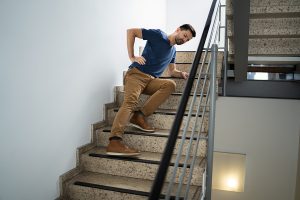4 Crucial Things To Know About Slip And Fall Accidents In Florida
 Michael Babboni
Premises Liability
Slip and fall accidents happen all the time. Sometimes they are harmless, but other times, they result in debilitating injuries. Slip and fall accidents are accidents involving slipping, tripping, or falling out of balance and then hurting yourself on another person's property. An individual does not necessarily have to fall to the ground for an accident to be considered a "slip and fall accident." If they lose their balance because of an external factor, such as a slick floor, uneven ground, or an obstacle.
Michael Babboni
Premises Liability
Slip and fall accidents happen all the time. Sometimes they are harmless, but other times, they result in debilitating injuries. Slip and fall accidents are accidents involving slipping, tripping, or falling out of balance and then hurting yourself on another person's property. An individual does not necessarily have to fall to the ground for an accident to be considered a "slip and fall accident." If they lose their balance because of an external factor, such as a slick floor, uneven ground, or an obstacle.If you slipped and hurt yourself on another person's property, do not keep it to yourself. More importantly, do not blame yourself right away. There are numerous factors that may have caused you to slip, and the property owner may be liable for it.
Things To Remember About Slip And Fall Accidents In Florida
Negligence Is At The Core
You can only sue for slip and fall accidents if you can prove that the accident is caused by someone's negligence. A property owner or a property manager may be liable for your injuries if they knowingly neglected to keep their business or property safe for customers or visitors. With that said, you cannot sue if your slip and fall accident is caused by your clumsiness. Nevertheless, you should determine who is at fault for your slip and fall accident before filing a case.
But You Should Also Consider Comparative Negligence
Although property owners and managers have the responsibility of being aware of safety hazards and repairing them, customers and visitors (or the victim) also have the responsibility to be aware of their surroundings and avoid accidents when possible. What this means is that if it were possible, you should have done what you can to prevent yourself from getting hurt. The property owner will most likely bring up comparative negligence in a slip and fall case to minimize their liabilities. So, this is one important factor to consider.
The Property Owner Or Manager Should Have Actual Or Constructive Knowledge
As mentioned, the property owner or manager is responsible for keeping their premises reasonably safe for visitors. If they have actual knowledge of the safety hazard, which is to say that they are aware of it, and yet did not remedy it, they are definitely liable for your accident.
However, even if they claim to not have actual knowledge, property owners and managers still have the burden of constructive knowledge, which means that they should have known about the safety hazard and, therefore, should have done something to remedy it. Constructive knowledge is applicable in situations where:
• The safety hazard has existed for a length of time such that it is unreasonable for the property owner or manager to not have known about it in the course of exercising ordinary care.
• The safety issue occurred regularly that it has become foreseeable.
There Is A Statute Of Limitations
As with most things in Florida, filing a slip and fall case has a statute of limitations. The statute of limitations dictates how long after the accident you may file a lawsuit. In Florida, the statute of limitations for slip and fall cases is 4 years. The state takes into consideration the possibility that some injuries may take time to become evident.
Handle Your Slip And Fall Case With Care
Slip and fall cases are rarely black-and-white. You will need concrete evidence to prove the owner or manager's liability to be compensated for your damages. With the help of a skilled St. Petersburg slip and fall lawyer, you can get compensated for medical treatments, lost wages, pain and suffering, and other expenses you acquired due to the injury.
